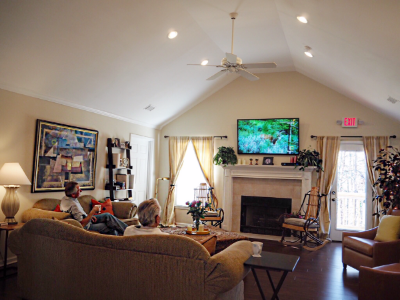Families and potential residents often can be confused by the overwhelming options when long- term care facilities are being explored. What sets a Personal Care Home, like Regency Manor, apart from Nursing Homes and other assisted living options?
What is a personal care home?
Personal care is a special combination of housing, personalized supportive services, and health care designed to respond to the individual needs of those who require help with activities of daily living (ADL’s).
Personal care promotes maximum independence and dignity for each resident and encourages the involvement of a resident's family, neighbors, and friends. Staff is available 24 hours a day to meet both scheduled and unscheduled needs. Regency Manor is distinguished because it offers a true home-like experience.
Who lives in Personal Care Home communities?
It is estimated that one million Americans live in more than 20,000 Personal Care Homes or assisted living facilities. Residents may suffer from memory disorders, may simply need help with mobility, incontinence or other challenges. A Personal Care Home is appropriate for someone who is too frail to live at home, requires extra support, but does not want to lose the sense of a home-like atmosphere.
How are Personal Care Homes regulated?
Regulations and license requirements vary from state to state. Most Personal Care Home providers and their staff have special training. Residences also must comply with local building codes and fire safety regulations.
Regency Manor is licensed with the state of Georgia via the Georgia Department of Community Health. We are also fortunate to have a Georgia Board certified RN as a part of our homes management team. All staff is CPR and First Aid certified and requires successful completion of annual competencies and continued learning hours.
What types of services are offered in Personal Care Homes?
Personal Care Homes generally provide more health-related services than an independent living retirement home. The services available in personal care usually include:
- Three nutritious meals a day served in a common dining areas
- Housekeeping services
- Medication Management
- Transportation
- Assistance with instrumental activities of daily living, shopping, making and keeping appointments etc.
- Access to health and medical services
- 24-hour home security and staff availability
- Emergency call systems
- Health promotion services
- Social and recreational activities
- Pet visits (if requested)
What is Respite Care?
Regency Manor also offers respite care services for families needing short-term relief. For the 65 million Americans caring for an aging or disabled loved one, respite care can serve a number of valuable functions. Respite is often used when:
- The family caregiver needs to travel
- The family caregiver needs a break
- A family is gradually easing their loved one into life at a senior community
What about cost?
Costs can vary dependent on the residence, rooming request (single room or shared), and the types of services needed by the residents. Across the nation, Personal Care Home costs are generally less expensive than private home care. At Regency Manor billing is done on a monthly basis with no hidden fees.
